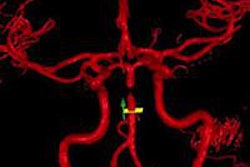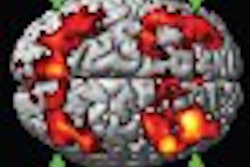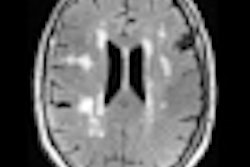MR and PET images show that vascular brain injury from conditions such as high blood pressure and stroke has a considerably greater influence on cognitive impairment among nondemented older people than beta-amyloid plaque deposits, according to a study published online February 11 in JAMA Neurology.
The study also contradicted previous animal research that suggested a correlation between having a stroke and greater beta-amyloid deposition in the brain. The researchers found no evidence to support that conclusion. Beta-amyloid plaque has been implicated in past studies in the development of Alzheimer's disease.
Lead study author Bruce Reed, PhD, associate director of the University of California, Davis Alzheimer's Disease Research Center, said half of the study participants had abnormal levels of beta amyloid and half had vascular brain injury.
"It was really very clear that the amyloid had very little effect, but the vascular brain injury had distinctly negative effects," Reed said in a statement. The more vascular brain injury experienced by the participants, the worse their memory and their ability to organize and solve problems.
For the study, Reed and colleagues recruited 61 men and women from Northern California between 2007 and 2012. The subjects ranged in age from 65 to 90 years, with an average age of 78 years. Thirty individuals were clinically normal, 24 were cognitively impaired, and seven were diagnosed with dementia, based on cognitive testing (JAMA Neurology, February 11, 2013).
Participants underwent MRI to measure vascular brain injury, while PET scans with carbon-11-labeled Pittsburgh Compound B (PiB) were utilized to detect and measure beta-amyloid deposition. Vascular brain injury appeared as brain infarcts and as white-matter hyperintensities on MRI scans.
MRI showed that 34 participants were positive for infarcts and 27 were infarct-negative, and the images were also used to quantify white-matter lesion volume. PiB-PET uptake ratios were used to create a PiB index by averaging uptake across regions vulnerable to early beta-amyloid deposits. Twenty-nine subjects were PiB-positive and 32 were PiB-negative, according to the researchers.
Memory and the ability to problem-solve and organize correlated negatively with brain infarcts, especially infarcts in cortical and subcortical gray matter, Reed and colleagues found. While infarcts were common, they varied greatly in size and location.
Conversely, the level of beta-amyloid deposits in the brain did not correlate with either changes in memory or executive function, and there was no evidence that beta amyloid combined with infarcts to impair thinking.
Reed said the findings are important because of the escalating interest in detecting Alzheimer's disease in its earliest possible stages, before an individual shows clinical symptoms.




















